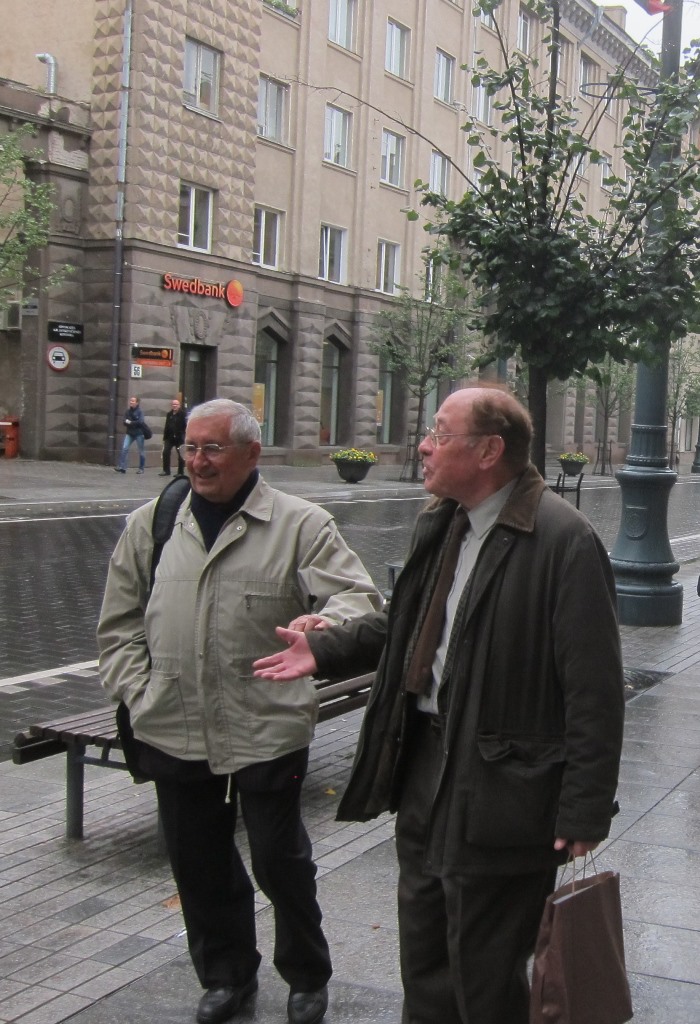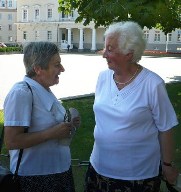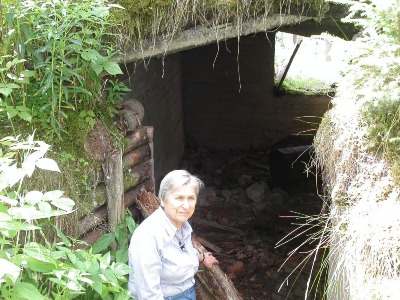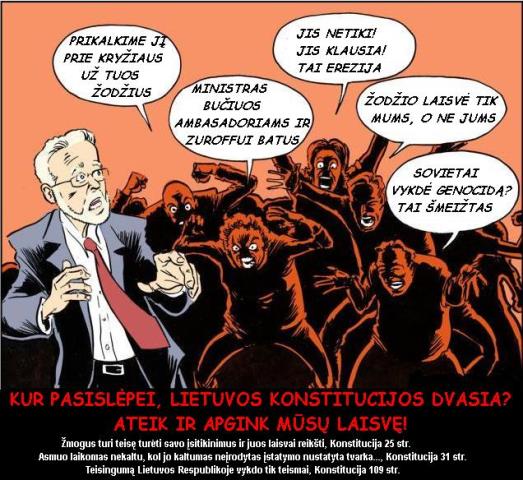◊
by Markas Zingeris
◊
Rachel Kostanian-Danzig, one of the founders of the Vilna Gaon Museum of Jewish History, is celebrating her venerable ninety-first birthday. She belongs to the generation that survived the horrific years of the Second World War as well the times of the Soviet regime, and saw the fall of the Iron Curtain: the geopolitical “earthquake” that allowed Lithuania to take back control of its own history.
During her youth in Soviet times, Rachel completed a law degree at Vilnius University and qualified as an English teacher at the city’s Pedagogical University. Her field was not history, until the breakup of the Soviet Union and the rise of Lithuanian liberty gave her the freedom to immerse herself in the history and culture of her Jewish people. But no historian’s diplomas could match her relentless, painstaking and passionate desire to meaningfully fill the gaps in Lithuanian collective memory. Today’s young professionals could envy her enthusiasm and “engagement.”
Continue reading
Posted in Lithuania, Litvak Affairs, Museums, News & Views, Rachel Kostanian
|
Tagged Christoph Dieckmann, Emanuelis Zingeris, Markas Zingeris, Rachel Kostanian, Saulius Suziedelis, Vilna Gaon Jewish State Museum, Vilna Ghetto
|
◊
◊
VILNIUS—The following (text below) is a translation from Lithuanian of the 2 March 2017 letter from the state-sponsored Genocide and Resistance Research Center of Lithuania (widely known as the Genocide Center) to a nationalist group that put on this year’s March 11th Independence Day neo-Nazi march, with authorities’ permission, in the center of Vilnius, the Lithuanian capital. The group had complained about Lithuania’s president, Dalia Grybauskaite, having granted an award on February 16th to Lithuania’s oldest Holocaust survivor, Fania Yocheles Brantsovsky, soon to turn 95, for her work in the field of Holocaust education. The president’s office had referred the complaint to the Genocide Center which issued this letter (facsimile of the original below). The correspondence was then read out at a bizarre ceremony that some observers thought bore the hallmarks of a 2017 “Jew-witch hunt” when the Independence day festivities announced a detour to the presidential palace to read out the various letters and condemn Fania Yocheles Brantsovsky, who is the only one of her family to survive the Holocaust precisely because she escaped the Vilna Ghetto in September 1943 and joined up with the anti-Nazi Soviet partisans, the only force seriously challenging Hitler’s rule of Lithuania.
Continue reading
Posted in A 21st Century Campaign Against Lithuanian Holocaust Survivors?, Antisemitism & Bias, Christian-Jewish Issues, Documents, Double Genocide: The New Form of Holocaust Revisionism & Denial, Dovid Katz, EU, Fania Yocheles Brantsovsky (Fania Brancovskaja): 1922-2024, Holocaust Policies of Mr. Ronaldas Račinskas and the State-Sponsored "International Commission" (ICECNSORL), Human Rights, Lithuania, Litvak Affairs, News & Views, Opinion, Politics of Memory, Vilnius, Vilnius's Genocide Center and the Genocide Museum it Manages
|
Tagged Arvydas Anusauskas, Dalia Grybauskaite, Fania Brancovskaja, Fania Brantsovsky, Genocide Center Vilnius, Jewish partisans in Lithuania, Vilna Ghetto
|
◊
 The unfortunate and wasteful campaign of Holocaust obfuscation waged by certain East European state institutions continues apace. The level of investment continues to strike outsiders as puzzling, given current economic and cultural issues and the younger population’s clear focus on the future and a better life for all in the new and multicultural European Union. Here in Lithuania, the first victims of the government’s (rather Soviet-style) “genocide industry” are the hard-working people of the country who deserve more judicious disbursement of their nation’s resources. The state-sponsored Genocide Center has just released three simultaneous editions (English, Lithuanian and Russian) of a new book on the Vilna Ghetto by historian Arūnas Bubnys, its own “director of the Genocide and Resistance Research Department.”
The unfortunate and wasteful campaign of Holocaust obfuscation waged by certain East European state institutions continues apace. The level of investment continues to strike outsiders as puzzling, given current economic and cultural issues and the younger population’s clear focus on the future and a better life for all in the new and multicultural European Union. Here in Lithuania, the first victims of the government’s (rather Soviet-style) “genocide industry” are the hard-working people of the country who deserve more judicious disbursement of their nation’s resources. The state-sponsored Genocide Center has just released three simultaneous editions (English, Lithuanian and Russian) of a new book on the Vilna Ghetto by historian Arūnas Bubnys, its own “director of the Genocide and Resistance Research Department.”
Dr. Bubnys is also a member of the state-sponsored “International Commission for the Evaluation of the Crimes of the Nazi and Soviet Occupation Regimes in Lithuania” (known for short as the “red-brown commission”). He was one of a minority of members of the Commission who refused to sign the (in the opinion of some, inadequate) letter of 14 October 2013 to Dr. Yitzhak Arad.
Continue reading
Posted in "Red-Brown Commission", Books, Double Games, Double Genocide: The New Form of Holocaust Revisionism & Denial, Dovid Katz, Dr. Arūnas Bubnys and State Holocaust Revisionism in Lithuania, Dr. Rokhl (Rachel) Margolis (1921-2015), EU, History, Lithuania, Litvak Affairs, News & Views, Opinion, Poland, Politics of Memory, Ponár (Ponary, Paneriai), Vilnius's Genocide Center and the Genocide Museum it Manages
|
Tagged Arunas Bubnys, Genocide Center Vilnius, Holocaust Obfuscation, International Commission for the Evaluation of the Crimes of the Nazi and Soviet Occupation Regimes in Lithuania, Lithuania, Vilna Ghetto, Vilnius, Yitzhak Arad
|
The following is the text provided by the office of Simon Malkes (Paris) of the speech he delivered at a conference held at the Lithuanian parliament on 22 September 2013, as part of the series of events of the Fourth International Litvak Congress in Vilnius, Lithuania. Mr. Malkes, a Vilna native and survivor of the Vilna Ghetto, is president of the ORT school network.

Simon Malkes (right) speaks to an old friend on Gedimino Boulevard in central Vilnius, after his speech at a session of the Fourth International Litvak Congress held at the Lithuanian Parliament (Seimas).
My name is Simon Malkes. I am a French citizen, living in Paris since 1952. I am a rare survivor, among the less than one percent of Vilna Jewry. I survived thanks to the German officer Karl Plagge who managed the HKP automobile works camp in Vilnius between 1941 and 1944. In 2005, I succeeded to obtain from Yad Vashem in Jerusalem the Righteous Among the Nations title, posthumously, for Karl Plagge.
Continue reading
The Society for the Promotion of the European Human Rights Model, based in France, today published on its website a statement of protest concerning the decision by the Yivo Institute for Jewish Research to host Lithuania’s foreign minister as ‘guest of honor’ at a 22 September 2011 event to commemorate the Vilna Ghetto.
The statement, signed by the society’s president, Didier Bertin, begins with the following text:
Continue reading
 marked three years to the day since police in Vilnius came looking for Holocaust Survivors Dr Rachel Margolis (born 1921, at right of photo) and Fania Yocheles Brantsovsky (born 1922) in a ‘war crimes investigation’ that has still not been publicly closed.
marked three years to the day since police in Vilnius came looking for Holocaust Survivors Dr Rachel Margolis (born 1921, at right of photo) and Fania Yocheles Brantsovsky (born 1922) in a ‘war crimes investigation’ that has still not been publicly closed.
Both women were incarcerated in the Vilna Ghetto from 1941 to 1943. Both lost their entire families to the barbarity of the Nazis and their local collaborators. They both escaped, on different days in September 1943, to join up with the anti-Nazi partisans in the forests of Lithuania. The underground forest fort, a half-hour’s drive from Vilnius, the Lithuanian capital, where Fania lived with another hundred or so Jewish escapees of the Vilna Ghetto, is being allowed to sink into the ground and disappear from history’s view.
Continue reading
Posted in A 21st Century Campaign Against Lithuanian Holocaust Survivors?, Antisemitism & Bias, Double Genocide: The New Form of Holocaust Revisionism & Denial, Dr. Rokhl (Rachel) Margolis (1921-2015), Events, Fania Yocheles Brantsovsky (Fania Brancovskaja): 1922-2024, Free Speech & Democracy, Human Rights, Lithuania, News & Views, Politics of Memory
|
Tagged Fania Brancovskaja, Fania Brantsovsky, Fanja Brancovskaja, Lithuanian Human Rights Association, Lithuanian Ministry of Foreign Affairs, Lithuanian prosecutors, Prague Declaration, Prague Declaration on European Conscience and Communism, Prague Process, Rachel Margolis, Vilna Ghetto, Yitzhak Arad
|
by Dovid Katz
◊

Fania Yocheles Brantsovsky, born in 1922, who lost her entire family in the Holocaust, escaped the Vilna Ghetto several moments before it was encircled by police preparing for its final liquidation on 23 September 1943. Together with Dobke Develtov [update: who passed away in 2012 in Los Angeles], she made it to this underground anti-Nazi partisan fort that was home to fighters aligned with the Soviet partisans. The precise number of inhabitants varied with newcomers and deaths in battle. Fania remembers at one time 99 of 101 were Jewish Vilna Ghetto escapees, at another 101 of 107. An underground bunker like this was home until the fall of Nazi rule in July 1944.
Along with other Holocaust Survivors who resisted — including Yitzhak Arad and Rachel Margolis — Ms Brantsovsky, librarian of the Vilnius Yiddish Institute, has in recent years been the object of a campaign of defamation and harassment in Lithuania.
The antisemitic press has targeted her (January 2008). Armed police came to search for her (May 2008). Prosecutors told the press she could not be found (May 2008). The editor of Lithuania’s main news portal called for her to be tried (May 2009). The mainstream media, citing ruling-party members of Lithuania’s parliament, branded her a war criminal (Oct 2009). And one of the country’s leading associations for human rights (!) demanded that she and other Jewish partisan veterans be ‘sentenced’ for committing ‘a massive slaughter’ (Dec. 2010).
All in the absence of any charge or iota of evidence.
Continue reading




